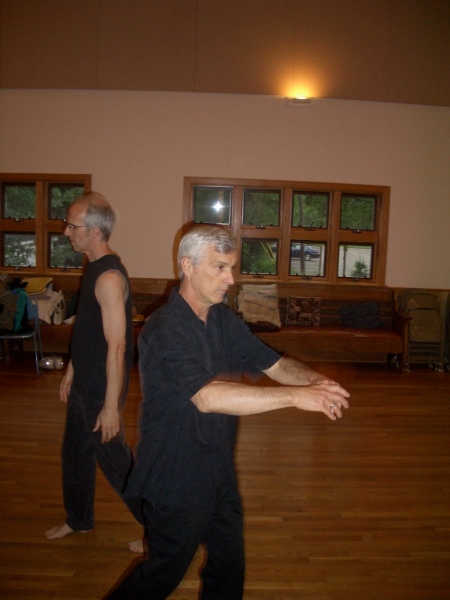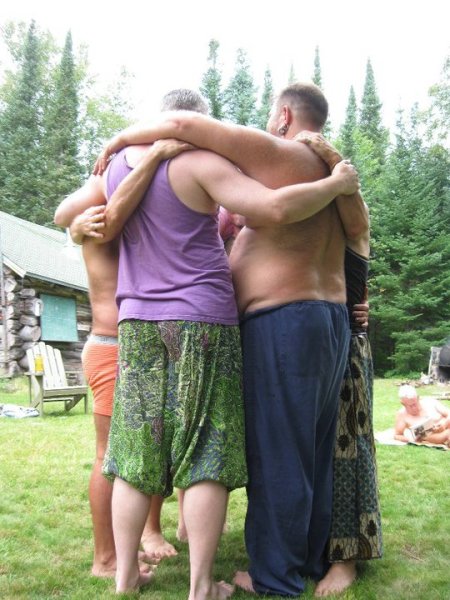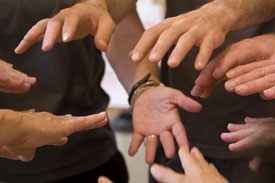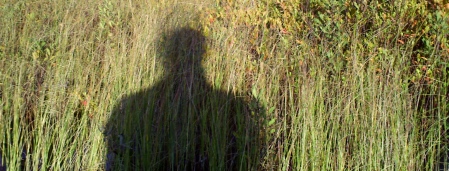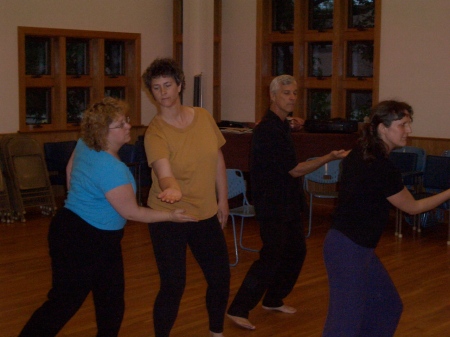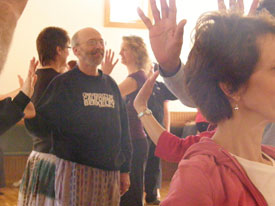At an improvisational InterPlay session a few years ago at Lockhart prison near Austin, Texas, female inmates followed the lead of troupe members, sharing personal stories about rain.
A woman said her worst beating had occurred after playing, as a child, in a puddle in her Sunday-best church clothes. Expressing the painful experience to music, she marched angrily as if stomping in puddles of water.
“I could see what she was doing was very big to her,” said Sheila K. Collins of O’Hara, who led that day’s program.
When the inmate began crying, InterPlay members and fellow inmates embraced her.
“Now her memory of that incident will include 15 women hugging her,” said Ms. Collins, a social worker and former professional dancer.
InterPlay is an organization that re-teaches adults how to play, using music, dance, song and storytelling to heal and promote self-discovery.
“Adults have to reclaim what we used to do,” she said. They need to use the arts “to feel good about [themselves] and connect with others.” InterPlay was founded to help them do it.
Begun in 1989 in Oakland, Calif., InterPlay is practiced in 50 cities on five continents. Ms. Collins, a board member, established it in four Texas cities before moving to Pittsburgh in 2006.
Ms. Collins is director of the Wing & a Prayer Pittsburgh Players, an InterPlay-based performance group.
InterPlay is devoted to fun, its website, www.interplay.org, says. But it uses fun to integrate body, mind, heart and spirit.
While children sing, dance and play, regardless of how they sound or look to others, adults do not, Ms. Collins said.
“We have excuses, such as: ‘I’m not good enough’ and ‘People will laugh.’ ” InterPlay helps adults get past those fears.
At weekly practices, about 20 core troupe members begin with stretching and other movement exercises.
Words are chosen to reflect the theme of the evening or of an upcoming performance.
If, say, “food” is a theme word, members take turns sharing their reflections on food via moving, singing or storytelling.
“It begins with small, little steps that are very affirming, and before long you are doing much more complex improvisational forms and you feel very creative,” said research psychologist Pam Meadowcroft of Shadyside.
She and husband Jim Holland, an emeritus professor of psychology at the University of Pittsburgh, are five-year troupe members.
Practices and shows include live music from members playing instruments such as keyboard, guitar or drum.
At performances, which are unscripted, the troupe might begin with a theme word to show the audience how InterPlay works, followed by members’ partnering with the audience.
The partners tell their stories to each other before switching partners and repeating the process.
“It helps us get past the usual way we do things and make discoveries about ourselves and others,” Ms. Collins said.
InterPlay also fosters camaraderie among the generations.
“These mechanisms of storytelling and movement and music are all connectors,” said Ms. Collins, whose grandchildren also participate. “It’s just fun,” she said.
Lois “Toni” McClendon of Swissvale, who is a storyteller in the African American oral tradition, is in the leader training program. She has taken classes at the Oakland facility and at Ms. Collins’ home.
Ms. McClendon said she would like to spread InterPlay to the black community because she thinks it would help with violence issues in the community by reducing stress and fostering inner peace.
“We don’t play enough,” she said.
Ms. Collins said InterPlay is especially relevant because the world is highly technical.
“The more time we spend in front of a screen — televisions, computers and smart phones — the more hungry we are for that real connection,” she said.
“Our ancestors sang and danced and told stories together, and we’ve lost that. InterPlay is bringing the old back and making it new.”
The troupe has performed at the Pittsburgh Center for the Arts, Mt. Lebanon Village Intergenerational Games, Gilda’s Club, Sarah Heinz House and hospitals in the University of Pittsburgh Medical Center.
Its next performance will be during a daylong retreat April 9 at the First United Methodist Church of Pittsburgh, 5401 Centre Ave. The event is sponsored by Persad, a group that serves the gay, lesbian, bisexual and transgender community.
A show at the Pittsburgh Center for the Arts is tentatively scheduled for May 5.
Ms. Collins, who has a doctorate in adult and continuing education, will teach Aging Gracefully with InterPlay for seniors from May 10 to June 7 at the University of Pittsburgh.
For more, call Ms. Collins at 412-223-2536, e-mail sheilacollins@yahoo.com or visit www.sheilakcollins.com.
First published on March 10, 2011 at 5:31 am



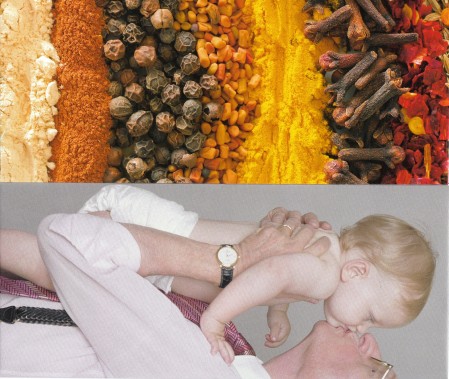




 Posted by martrodd
Posted by martrodd 
